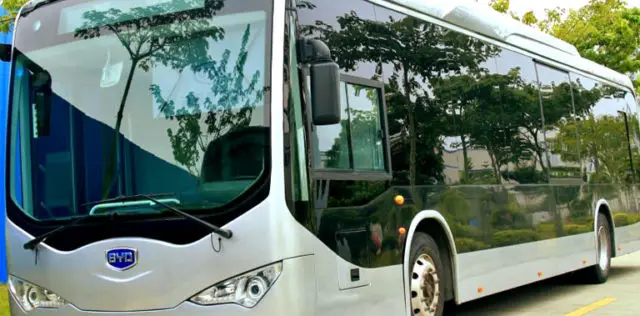During the closing of this year, an electric bus will provide internal service for students, staff, and visitors at the Rodrigo Facio campus of the University of Costa Rica (UCR) in San Pedro de Montes de Oca.
The announcement was made in the sports facilities of the UCR in Sabanilla, the First Lady of the Republic, Claudia Dobles, the rector of the University of Costa Rica, Henning Jensen, the corporate director of Electricity of the ICE Group, Marco Acuña and Ministry authorities of Environment and Energy and the Ministry of Public Works and Transportation.
“This is a wonderful opportunity for all people to approach the university and can ride the electric bus, to know all the benefits of this technology, to see that it has no muffle, does not emit smoke or polluting particles, does not make noise nor use gasoline. It is also very spacious and comfortable and with great autonomy. It is amazing”, commented the First Lady.
The bus belongs to Cori Motors and entered the country for a period of 6 months so that institutions and operators can test and learn about the technology. The ICE Group will manage its use during its stay in Costa Rica, and, through an agreement with the UCR, it will be available to mobilize staff, students,
“The UCR, in clear commitment to the purpose of decarbonization, not only wishes to collaborate with the central government and its instances in the face of any effort that involves the reduction of greenhouse gases, but also provides its expertise to the Executive and the country to achieve this goal”, said the rector of the UCR, Henning Jensen.
He added that the circulation of this bus, together with the Costa Rican Institute of Electricity, should also serve as a strong signal of the institution’s commitment to be carbon neutral, thanks to our carbon footprint reduction policies, such as reuse, ban on single-use plastics, elimination of stereo consumption and the recycling incentive.

“We also hope that this agreement with ICE will allow us greater interaction to develop joint pilot programs in the way of environmental protection and the reduction of these gases, agents that promote climate change that threatens so much for our country and region”, he added.
For his part, Marco Acuña said: “In Grupo ICE we assume the challenge of socializing the benefits of electric mobility. We work so that Costa Ricans enjoy the advantages of transporting buses without smoke or noise, moved with renewable energy from the National Electric System. Starting with the students and officials of the UCR reflects our commitment to the well-being of the entire population”.
It is expected that in the following months, the bus can be mobilized to other universities and institutions so that more people can use it and learn about the great benefits of electric buses.
On the electric bus
The bus used for this test is BYD. It has the dimensions that most of the units that transit in the Greater Metropolitan Area normally share, with a length of 12 meters, a width 2.5 meters and a height of 3.3 meters.
You can travel on national roads without any problem. It has a height of 37 centimeters to the floor, and therefore you can travel through normal obstacles such as speed bumps on roads. In addition, it has a system that allows you to change the height if necessary.
It has 30 seats and a space of 9 square meters for passengers on foot, 2 for wheelchairs and can carry 60 passengers. It has a wheelchair access system and meets the requirements of our legislation for free transit and ease for people with disabilities.
It can travel at 70 km/h with acceleration from 0 to 50 km/h in just 23 seconds. Its management of slopes of 16%, is enough to climb slopes. For this, it has 2 engines, one on each axle, of 100 kW each, for a total of 200 kW, or 268 horsepower (hp), and which allow a torque of 2 × 430 Newton-Metro.
Its 324 kWh iron-phosphate battery gives it a range of autonomy of 250 kilometers in our typical topology, which can be charged from 0 to 100% in just 4 or 5 hours. Finally, being an electric vehicle, the noise level does not exceed 72

